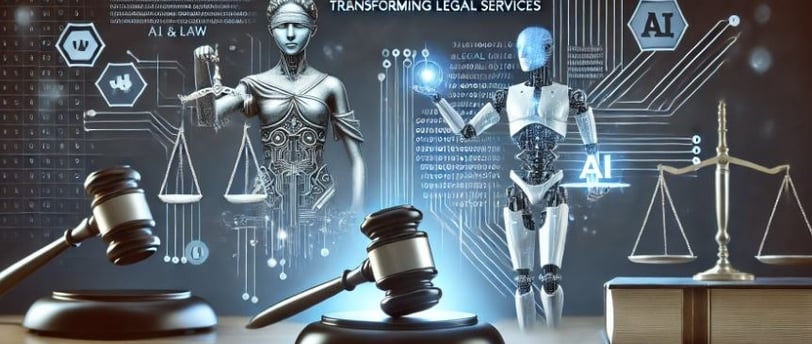AI & Law: How Artificial Intelligence is Revolutionizing Legal Services
Discover how AI is transforming the legal industry by streamlining tasks, improving accuracy, and reshaping legal careers. Learn about its benefits, challenges, and future in law.
"LOOKING FOR LEGAL EXPERTISE IN THE ERA OF AI? CONTACT AWAIS LAW FIRM FOR TAILORED ADVICE ON TECHNOLOGY-DRIVEN LEGAL SOLUTIONS."
Awais Law Firm
10/21/20242 min read


AI & Law: Transforming the Legal Landscape
Artificial Intelligence (AI) has emerged as a transformative force across industries, and the legal sector is no exception. From streamlining routine tasks to reshaping legal analysis, AI is redefining how lawyers operate and how clients engage with legal services. This blog explores the impact of AI on the legal profession, its benefits, challenges, and the future it promises.
The Role of AI in Law
AI is being integrated into various aspects of legal work, including:
Document Review and Analysis: AI-powered tools like e-discovery software can analyze vast amounts of documents, identifying relevant information with greater speed and accuracy than manual review.
Legal Research: Platforms such as Westlaw Edge and ROSS Intelligence use natural language processing (NLP) to deliver precise legal precedents and case law insights.
Contract Management: AI tools can draft, analyze, and manage contracts, identifying potential risks or inconsistencies.
Predictive Analytics: AI algorithms analyze past case outcomes to predict likely judgments, assisting lawyers in crafting better strategies.
Virtual Legal Assistants: Chatbots and AI assistants handle client queries, schedule appointments, and provide basic legal advice.
Benefits of AI in Legal Practice
Efficiency and Cost Reduction: AI automates repetitive tasks, allowing lawyers to focus on complex legal analysis and client interaction, reducing operational costs.
Accuracy and Consistency: AI minimizes human errors in tasks like document review and legal research.
Enhanced Access to Justice: Affordable AI-powered tools make legal services more accessible, especially for individuals and small businesses with limited resources.
Challenges and Ethical Considerations
While AI offers significant benefits, it also poses challenges:
Bias in Algorithms: AI systems can inherit biases from the data they are trained on, potentially leading to unfair outcomes.
Data Privacy: Handling sensitive legal information requires stringent data security measures to prevent breaches.
Regulatory Uncertainty: Laws governing the use of AI in legal practice are still evolving, creating uncertainties for lawyers and clients.
Human Oversight: While AI aids efficiency, the final decision-making in legal matters must remain a human responsibility to ensure fairness and ethical compliance.
AI’s Impact on Legal Careers
AI is not replacing lawyers but reshaping their roles. Legal professionals must adapt by acquiring tech-savvy skills and focusing on tasks requiring emotional intelligence, strategic thinking, and personalized advice. The demand for AI-literate lawyers is growing, opening new career opportunities in legal technology and innovation.
The Future of AI in Law
The legal profession is on the brink of an AI-driven transformation:
Smart Contracts: Blockchain and AI integration will facilitate self-executing contracts, reducing disputes and delays.
Global Collaboration: AI tools enable seamless cross-border collaboration by breaking language barriers and providing jurisdiction-specific legal insights.
Enhanced Court Systems: AI can assist judges in reviewing evidence and drafting judgments, expediting legal proceedings.
Conclusion
AI in law offers immense potential to enhance efficiency, accessibility, and decision-making. However, its adoption must be balanced with ethical considerations and human oversight. Lawyers embracing AI tools will be better positioned to thrive in a rapidly evolving legal landscape.
For expert advice on navigating AI-related legal matters or integrating AI solutions into your legal practice, contact Awais Law Firm. Let us help you stay ahead in this tech-driven era of law.
